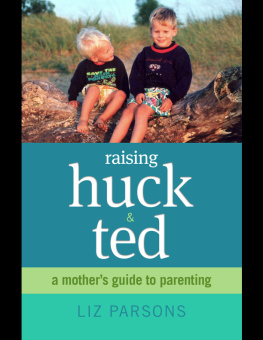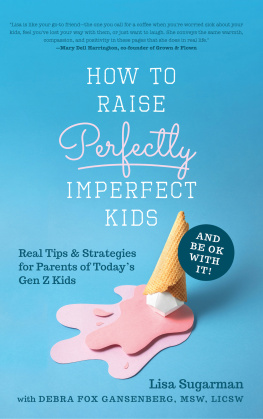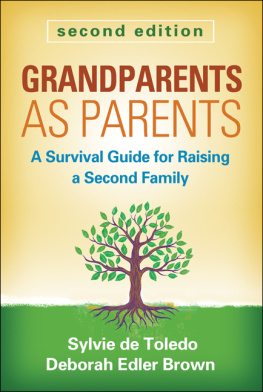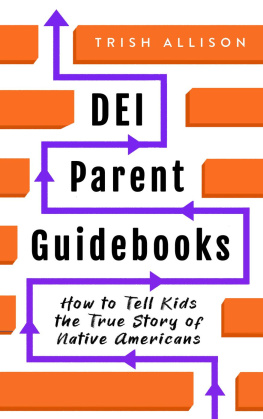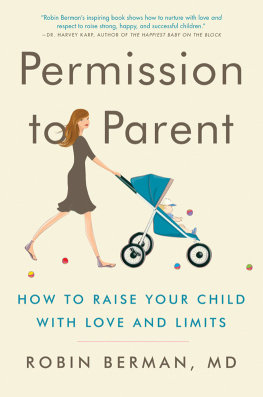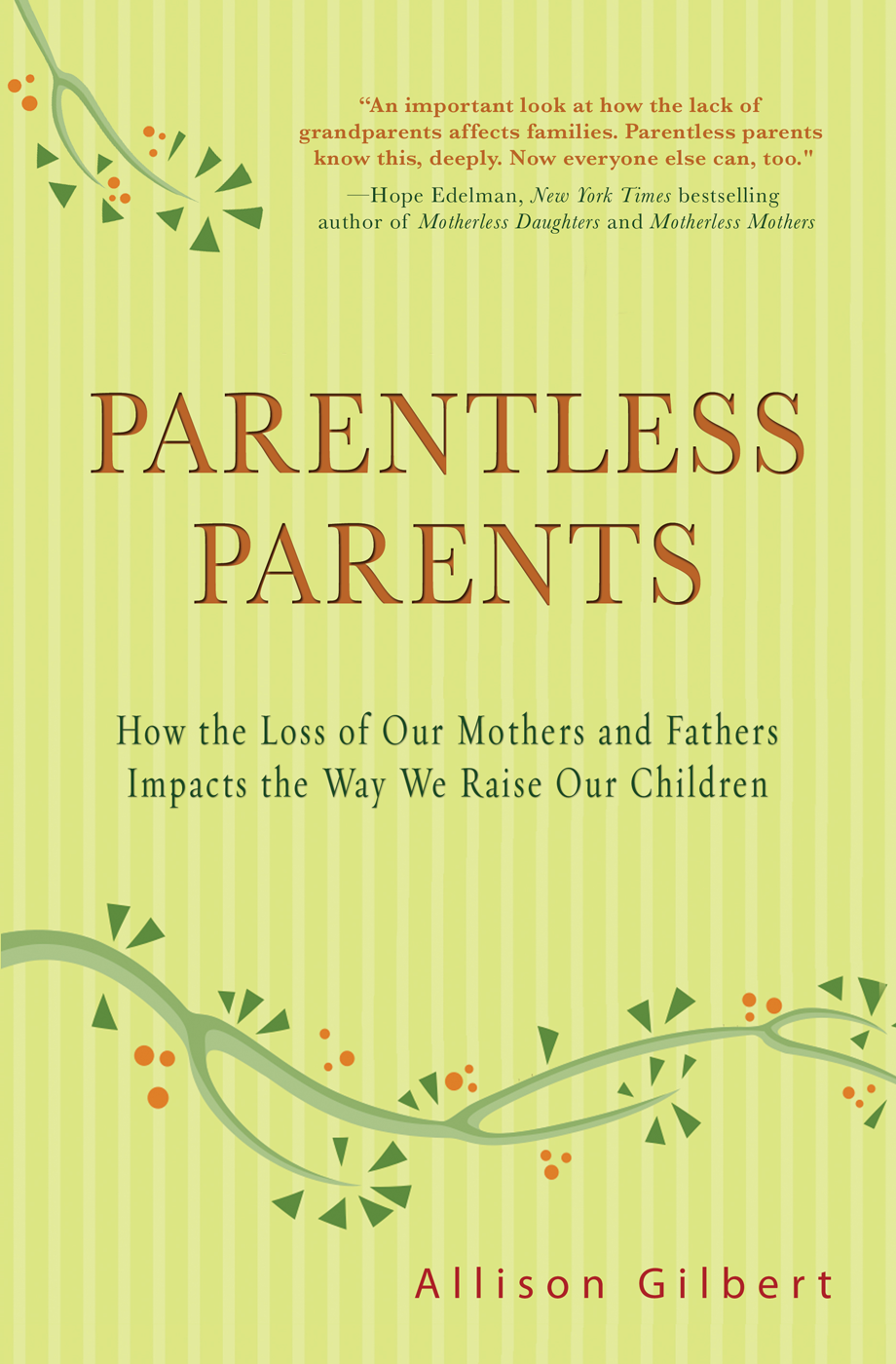
For my children, Jake and Lexi, and their
grandparents, Sidney and Lynn
There are only two lasting bequests we can hope to give our children. One of these is roots; the other, wings.
Hodding Carter
With few exceptions, the parentless parents I interviewed for this book allowed me to use their real names, and for that I am exceptionally grateful. In cases where details were deemed too private, I gladly agreed to change identifying facts to ensure anonymity.
M y dad all but predicted I would crumble after he died. For years after my mother passed away from ovarian cancer, he and I would meet for lunch in New York City. We both worked in midtown Manhattan and loved getting together, alone. No stepmother. No son-in-law. Just us. We called them dates, and he was the perfect companion: great at conversation, always interested in what I had to say, and he would never let me pay. Once when I was two months pregnant and craving spicy food, he suggested we eat Mexican. After we left the restaurant, he took my hand into his thick, calloused palm and we began walking in the direction of his office. When we got to the corner and were waiting to cross the street, he mentioned something that seemed so innocuous at the time that I barely paid it any attention. In fact, I remember shrugging it off. He said, You better be okay when I die. Because it will happen.
My father was trying to be helpful, Im sure. To brace me for the inevitable: that one day I would be parentless. But hadnt I been all right since Mom passed away? I had gotten married, was expecting a baby, and had a great job. I loved my mother and missed her completely, but I assured my dad (convinced myself?) that I was fine. But my dad was prophetic. Two years after that conversation, he, too, was dead. And to be truthful, I wasnt okay. I was devastated.
My dad had an energy that filled rooms. His ego was even bigger. So when he was diagnosed with lung cancer, his rapid deterioration was all the harder to watch. His world, which had been full of business trips to Moscow and tickets to the latest museum exhibitions and cultural events, shrunk almost immediately to a footpath between his apartment and his doctors office. The disease not only sucked the life out of him, it drained it out of me, too. I had seen this show before and knew how it ended. My sadness more than doubled. It was worse because since my mom had died, Id become a mother myself. I not only mourned my father, but also grieved the loss of him as a grandfather. And Jake, at eighteen months, would never remember him. He never even met my mother. I had become a parentless parent.
Since then, and with the birth of my daughter, I have learned that so much of what parentless parents miss is irreplaceable. My husband, Mark, is affectionate and loving, and his parents are warm and givingbut its not the same. No matter how supportive our spouses and in-laws, no matter how deep our bench of babysitters, no matter how many parenting books and magazines we read, nobody can fill the void our mothers and fathers left behind. Our parents cant pass on family traditions. Our parents cant share stories about living relatives or ancestors. And they cant tell us what we really need to know as parentshow we behaved at certain ages and stages. If we had even one parent, thered at least be the possibility that some of that information could be passed along directly.
Holidays are particularly difficult. My parents divorced when I was six, and my brother, Jay, and I always had two Thanksgiving dinners. Mom and Dad would alternate who got us on Thursday night and who would host Thanksgivingagainover the weekend. Every year I ate turkey, stuffing, and pumpkin pie in duplicate. The year my father died, my brother decided to host Thanksgiving, and as my husband and I barreled toward Pennsylvania with Jake snapped into his car seat behind us, I had trouble even faking a smile. I didnt feel old enough to be a parent without parents. For thirty-one years, I had been the one taken care of. I had been the child. I was good at being the daughter.
By the time our car rolled into my brothers pebbled driveway, I couldnt wait to get out and hug him. I hoped he would hold me, knowingly, lovingly, perhaps the way my parents would have, if they were still alive. Jay was standing in front of the house waiting to greet us. As soon as I saw him, though, I felt worse. His freckled arms were outstretched and raised high in anticipation of good times ahead. A smile ballooned across his face. I pretended not to see him and bent down underneath the glove compartment, gathering imaginary belongings that had fallen out of my bag. I stayed there so long I felt blood pooling in my forehead and cheeks.
Oblivious to my charade, Mark got out of the car, took Jake from the backseat, and started walking to the house. I hoped their arrival would keep everyone busy so I could be left alone just a little longer. But I saw my brother coming. I steeled myself, opened the door, and reached out to him. But my arms were lower than his, and our hug was mismatched and awkward. I was prepared for a comforting embrace, the kind you give someone at a memorial service, but he seemed ready to celebrate.
It has taken me years to understand and accept that my brother and I mourn differently. Sometimes in the past, it has made me feel like an only child. In January and September, on the anniversaries of our parents deaths, I always call him seeking solace and connection. My calls are almost always met with surprise.
Everything inside the house looked and smelled fantastic. My sister-in-law, Randi, had a pot of apple cider on the stove, and her parents were sitting with Cheryl, my stepmother, and Cheryls two sisters, in the family room. They were having fun watching Jake and his older redheaded cousin, Dexter, play with Thomas the Tank Engine on the floor. A collection of unlit candles had been arranged in the center of the dining room table and twelve places were set, ready for dinner.
Except for me, everyone seemed relaxed and normal. My dad and brothers favorite Charlie Mingus CD was playing and we were all talking and laughing. But all that normalcy made me feel unsettled, lonely, and sick. This was Randis family. These were Cheryls sisters. Jay was there, but our family was gone.
I went through all the motions of happy; I smiled in all the right places and laughed at all the right times and pretended to be interested in the cheddar cheese and crackers on the kitchen counter. Part of me wanted to call attention to myself and be comforted, but mainly I just wanted to show our son a good time.
When we finally sat down to dinner, I had no appetite. I had been stuffing my emotions down my throat all day and was full. Throughout the meal, I tried to participate in various conversations but found myself unable to take my eyes off my nephew Dexter and his grandmother. I stared at her as she wiped cranberry sauce off his cheek, and then I looked at Jake in his high chair, face splattered with gravy, mashing turkey with a fork. My mother would never be able to show such affection to her grandson.
Rationally, seeing that scene unfold shouldnt have mattered. But my emotions resulted from the same jealous ache I felt watching my in-laws hold Jakes hand or give him a bath. And though my stepmother, Cheryl, was loving with Jake, I had trouble allowing her to fill that role. Cheryl had been the other woman. When I felt my eyes filling with tears, I excused myself from the table and walked toward the bathroom in my brothers bedroom, far from the main event, thinking it would be the safest, most private place to get myself together.
I never quite got there. Outside the bathroom was my brothers walk-in closet. At first, I just stopped in the doorway, glancing inside at nothing in particular. Then I was pulled in. I remember raking a group of hangers to the side and standing there, unable to move, looking at a flannel shirt that I was sure had belonged to my dad. The last time I had seen him wear it was the year before, when he and I took Jake to the Metropolitan Museum of Art for the first time. The excursion was my dads idea. His six-month-old grandson would learn about art and he would be the teacher.
Next page


